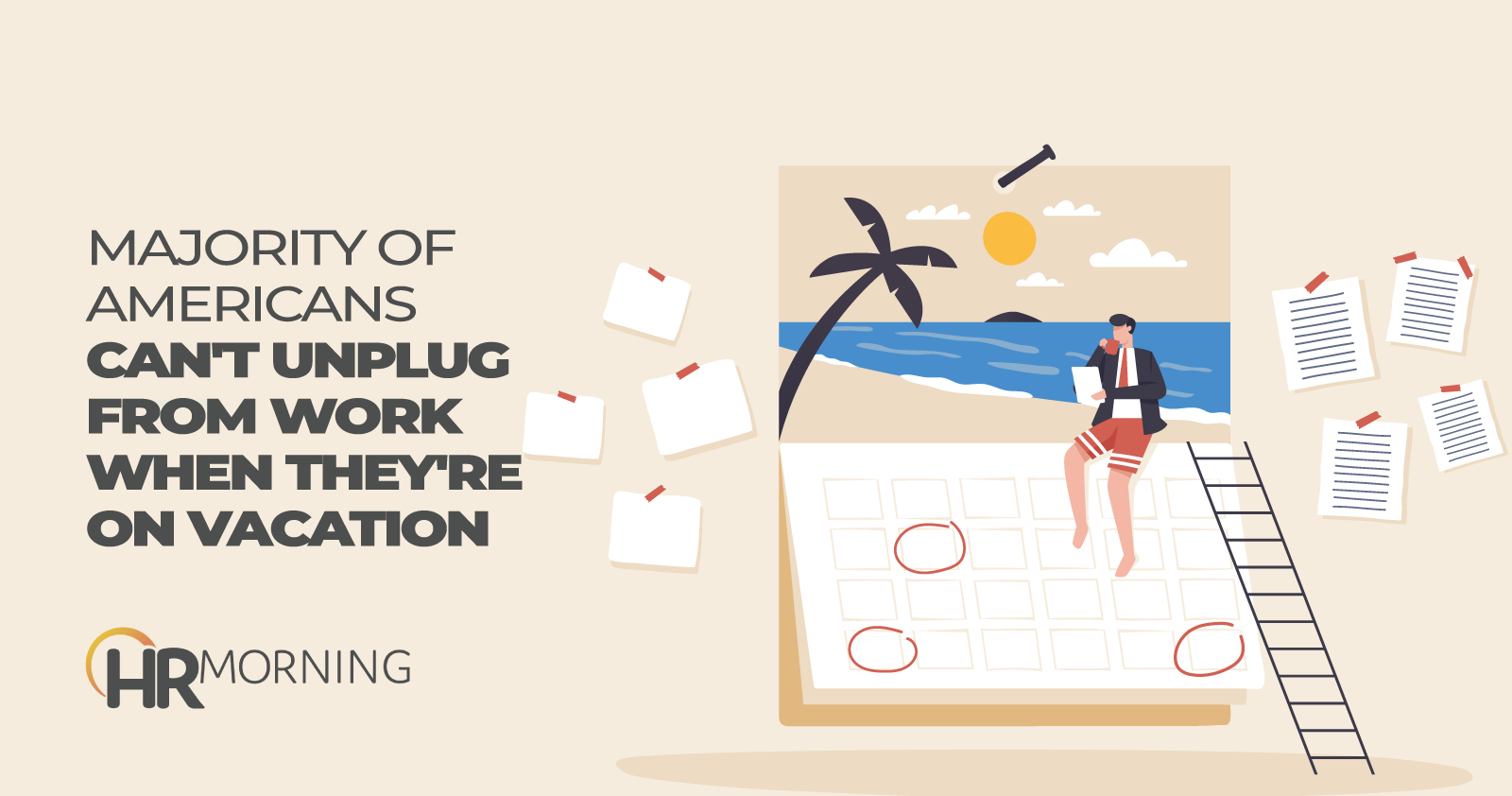When you think of vacation, you probably imagine sandy beaches, relaxing in the sun and … checking your email?
That’s the reality for the majority of Americans, according to a new study from ELVTR, which found that workers say it is incredibly hard to fully disconnect from work during time off.
Although working on vacation is often seen as a normal part of corporate culture, employees who can never fully turn off from work and take a break can be detrimental to businesses and themselves.
Why it’s so hard to unplug
A whopping 67% of Americans reported working on vacation. Why? Although 27% reported that they enjoyed their job and didn’t mind working on vacation, over a third (37%) said that they had no one to delegate tasks to. One in 10 reported working on vacation because their boss expects it.
Some may even feel guilty for taking true time off, with 35% reporting an implicit expectation to continue working on vacation.
Only one in four workers enjoy a truly work-free vacation, and 61% reported being bothered by colleagues during their time off, primarily by email (28%) and text messages (25%). However, workers also reported being contacted via social media and phone calls.
Although it can be easy to blame this trend on the rise of remote work and the ability to work from anywhere, findings could indicate that working on vacation is a larger, cultural issue that started well before the pandemic. Case in point: A 2019 study found that 66% of Americans reported checking their email at least “sometimes” during vacation, and a 2013 Pew Research Center study found similar results, with nearly half (42%) reporting they keep up with their email every day, even when on vacation.
The consequences of working on vacation
For some, checking an email or two during a vacation is no big deal – after all, over half of respondents (57%) reported feeling anxious if they don’t check their emails during time off. But even though it may feel like a small task, not taking time to unplug can have serious effects on employees and the business.
“Workers [can] suffer from increased stress and health issues, reduced productivity and, subsequently, fewer growth opportunities,” says Viktor Grekov, business productivity expert and founder of Oboard.
For employers, employees working on vacation and struggling to disconnect from work can lead to poor work-life balance and ultimately result in:
- Lower productivity
- Absenteeism due to burnout, and
- Higher turnover.
“Long term, innovation is stifled with the workforce focused on its own problems, turnover rates skyrocket as workers seek better work-life balance elsewhere and employers get a reputation for disrupting their employees’ personal time,” says Grekov. “Encouraging employees to sacrifice their personal time won’t save your business; you’re simply delaying the productivity loss.”
How HR and managers can help
Nearly half (46%) of workers admit that they struggle to disconnect during vacation time – but how can you help? It all comes down to cultivating a culture of taking time off and making recharging outside of work a priority.
“Businesses should make clear that they do not condone encroaching on employees’ time off by putting comprehensive policies and procedures in place regarding absences,” says Grekov. “A comprehensive strategy and system in place to ensure entire teams are working toward the same goals, there is no reason why one person’s absence should cause progress to ground to a halt.”
Then, business leaders can put it into action and lead by example. “Take your vacation, make clear who to contact in your absence, set your boundaries before you leave and offer the same respect to your colleagues when they’re away,” says Grekov. “Denying employees a break is never a sustainable solution — unless your company-wide goal is mass burnout and unending delays.”
For managers, supporting employees before and after vacation can help them feel confident enough to shut their laptops or silence emails during time off, giving them a chance to truly rest and recharge. Here’s how:
Before: Ensure that major tasks are delegated to other team members and address any problems likely to come up beforehand to avoid having to contact the employee on their vacation. You may also want to help employees set up ways to ensure they truly unplug, such as setting an away message on Slack or setting up an automated reply on their email.
After: Check in with the employee to ensure that they’re not overloaded with missed work and create reasonable deadlines for anything urgent. Provide plenty of support to help workers returning from vacation get back up to speed, like allowing a half day of interrupted “catch-up time” to sort through emails and prioritize tasks. A smooth transition back to work after a vacation can ensure that workers continue to take time off in the future.



